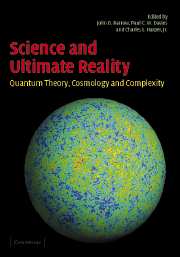Book contents
- Frontmatter
- Contents
- List of contributors
- Foreword
- Editors' preface
- Preface
- Acknowledgments
- Part I An overview of the contributions of John Archibald Wheeler
- Part II An historian's tribute to John Archibald Wheeler and scientific speculation through the ages
- 2 The heritage of Heraclitus: John Archibald Wheeler and the itch to speculate
- Part III Quantum reality: theory
- Part IV Quantum reality: experiment
- Part V Big questions in cosmology
- Part VI Emergence, life, and related topics
- Appendix A Science and Ultimate Reality Program Committees
- Appendix B Young Researchers Competition in honor of John Archibald Wheeler for physics graduate students, postdoctoral fellows, and young faculty
- Index
2 - The heritage of Heraclitus: John Archibald Wheeler and the itch to speculate
from Part II - An historian's tribute to John Archibald Wheeler and scientific speculation through the ages
Published online by Cambridge University Press: 29 March 2011
- Frontmatter
- Contents
- List of contributors
- Foreword
- Editors' preface
- Preface
- Acknowledgments
- Part I An overview of the contributions of John Archibald Wheeler
- Part II An historian's tribute to John Archibald Wheeler and scientific speculation through the ages
- 2 The heritage of Heraclitus: John Archibald Wheeler and the itch to speculate
- Part III Quantum reality: theory
- Part IV Quantum reality: experiment
- Part V Big questions in cosmology
- Part VI Emergence, life, and related topics
- Appendix A Science and Ultimate Reality Program Committees
- Appendix B Young Researchers Competition in honor of John Archibald Wheeler for physics graduate students, postdoctoral fellows, and young faculty
- Index
Summary
It has to be a jolting culture shock, or at any rate a severe case of the bends, for someone who has spent the past 60 years since completing the Gymnasium in 1942 studying, reading, translating, and interpreting St Augustine and St Thomas Aquinas, Martin Luther and the other sixteenth-century reformers, and the fourth-century Greek church fathers together with the Greek and Russian Orthodox tradition coming out of them, suddenly to be plunged into the rarefied atmosphere of this volume. Why, back where I come from, quantum is still a Latin interrogatory adjective in the neuter singular! One thing that I did learn, however, from Thomas Aquinas and his fellow scholastics was the doctrine of the analogia entis, the analogy of Being, which enables even a finite mind to speak by analogy about the Infinite (as the old proverb says, “A cat may look on a king”), because in some sense, at any rate in an analogous sense, it may be said that both of them “are,” even though only God “is” noncontingently; it has been brilliantly discussed in the Gifford Lectures of Professor Etienne Gilson at Aberdeen (Gilson 1944).
- Type
- Chapter
- Information
- Science and Ultimate RealityQuantum Theory, Cosmology, and Complexity, pp. 27 - 42Publisher: Cambridge University PressPrint publication year: 2004



